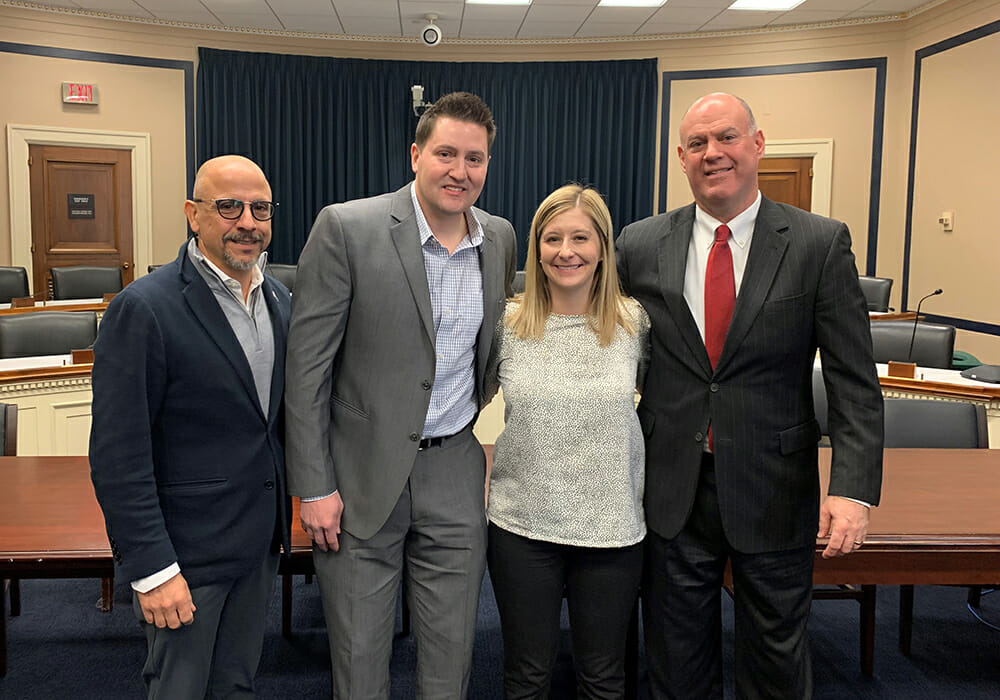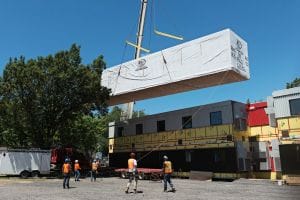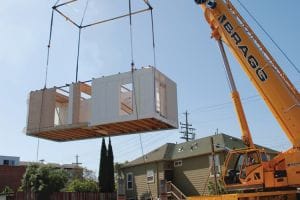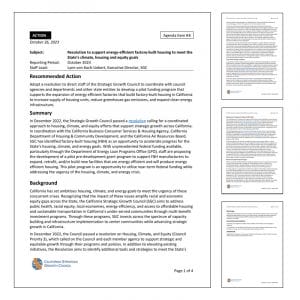MBI and Member Companies Brief House Committee on the Negative Impacts of the Davis-Bacon Act Expansion
MBI recently led a member delegation for a meeting in Washington D.C. with numerous Congressional staffers about the negative impact of the proposed Davis Bacon expansion. The staffers, representing Republican members of the House Education and Workforce Committee, heard from Jim Gabriel, President of Pennsylvania-based MODLOGIQ, and Alan Rasmussen, third-generation executive at Modern Building Systems in Oregon. Both shared their insights on exactly how the expansion would hurt their companies, their customers, and taxpayers in general. MBI Executive Director Tom Hardiman and industry lobbyists Jennifer Harper and Stacy Swanson also shared five reasons why this expansion is bad policy by the U.S. Department of Labor (DOL):
- Bad precedent for a government agency to expand its scope and grant “broader authority” without Congressional approval or hearings.
- Vaguely written rules provide little guidance as to when coverage applies, leaving contractors open to future claims, and unknown/undetermined scope and impact on construction costs.
- Detrimental to small and minority owned businesses. U.S. SBA Office of Advocacy submitted comments opposing this provision.
- Despite the claim that the financial impact is less than $100 per company, the cost of compliance is closer to $100,000 if the company can even comply.
- It does not fit! You cannot apply traditional on-site construction labor rates to a factory workforce with different skills, job functions, and responsibilities.

From left to right: Jim Gabriel of MODLOGIQ; Alan Rasmussen of Modern Building Systems; Kelly Tyroler, staff member for Congresswoman Virginia Fox (NC); and MBI executive director Tom Hardiman.
The purpose of the meeting was to keep the pressure on the DOL through Congressional channels, with the possibility of the House passing a Continuing Resolution to disapprove the new policy. Staffers representing the following Congressional representatives attended the meeting: Smucker (PA), Comer (KY), Walberg (MI), Allen (GA), Banks (IN), Miller (IL), Williams (NY), McClain (MI), Chavez-Deremer (OR), Owens (UT), Kiley (CA), Grothman (WI), Moran (TX), Houchin (IN), Thompson (PA), Burlison (MO), Good (VA), and Foxx (NC).
Special thanks to Kelly Tyroler, professional staff member for Congresswoman Virginia Foxx (NC) for arranging the meeting and inviting us to address our concerns.
MBI plans to meet each of the Congressional committee members in the near future to further the discussion.
How Can You Help?
Please consider making a one-time donation to MBI’s legal defense fund to ensure we have necessary funds to prevent this massive barrier to industry growth.
AND
Support Our Efforts to Help Grow the Industry - MBI's focus is to identify, reduce, and remove barriers while capitalizing on opportunities in key markets. To be successful, it is imperative that we continue to build our war chest, so funds are available when needed.
We are asking all MBI member manufacturers to purchase one $20 MBI Seal for each new module constructed.
Additional Government Affairs Articles
A Huge Win for the Modular Construction Industry in Massachusetts
In early February, 2024, the Massachusetts Board of Building Regulations and Standards (BBRS) released its proposed 10th Edition building codes. This draft included several amendments targeting modular construction that would have created an extremely difficult environment for the entire modular industry and could have eliminated the industry entirely in the state.
Read Complete ArticleFEMA Announces Hawaii Housing Plan Using Modular Construction
Utah becomes the second state in the country, following Virginia, to fully adopt ICC/MBI standards 1200 and 1205. MBI will continue to work with leadership in Utah to implement the new program.
Read Complete ArticleICC/MBI Standards 1200 & 1205 Provide Foundation for Utah’s First-Ever State Modular Program
Utah becomes the second state in the country, following Virginia, to fully adopt ICC/MBI standards 1200 and 1205. MBI will continue to work with leadership in Utah to implement the new program.
Read Complete ArticleBuilding at the Intersection of Housing Affordability & Energy Conversation
Tasked with looking at how the state of California can best house its growing population while meeting its aggressive energy, housing, transportation, land use, and equity goals, the California Strategic Growth Council (SGC) faces a slew of challenges. But, if the outlook of SGC Executive Director Lynn von Koch-Liebert is any indication, it’s only a matter of time before those challenges are successfully met.
Read Complete Article



